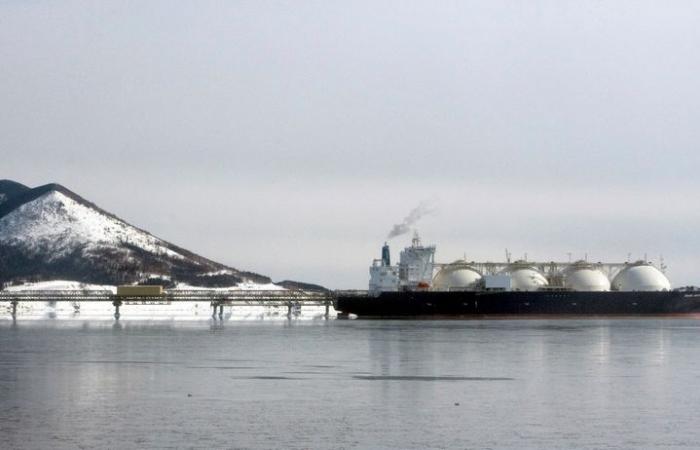
As Japan’s long-term contracts to supply liquefied natural gas (LNG) to Russia’s Sakhalin-2 project expire, competing producers see an opportunity to fill the supply gap even whether Tokyo seeks to transition to cleaner energy, according to industry insiders.
Falling gas demand in the country and geopolitical pressure on Tokyo to reduce its reliance on Russian fuels means Japanese buyers may not want to renew all their contracts with a long-favored supplier for its proximity and reliability.
Japan, the world’s second-largest buyer of liquefied natural gas (LNG), depends on Russia for 9% of its LNG, or 6 million metric tons per year, of which 5 million comes from long-term Sakhalin-2 contracts managed by Gazprom , controlled by the Kremlin.
The project also has close ties to Japanese industry, with trading giants Mitsui and Mitsubishi together owning 22.5% of the project.
The big advantage of Sakhalin-2 over its rivals is that it is located just a few days from Japan by sea. For comparison, shipments from Australia, Canada and the United States take over a week.
However, with Japan’s Western allies seeking to isolate Moscow over its war against Ukraine, Sakhalin-2 is out of favor, although the project is exempt from US sanctions.
“Maintaining the same level of supplies from Russia could prove difficult due to the agreement between G7 members to reduce dependence on Russian energy,” said a government official. Japan’s industry ministry, adding that final decisions rest with the buyers, which include several Japanese utility companies. The source could not be named due to the sensitivity of the issue.
At the same time, given Japan’s low electricity demand and its desire to use cleaner energy, LNG requirements are expected to decline. Tokyo wants gas to account for 20% of the country’s electricity generation by 2030, up from 33% last year, and for renewable energy to increase from 26% to 38% over the same period.
“There is a lot of renewable energy produced in our region, so whether to renew the contract or not will depend on future renewable energy capacity,” an executive with the company told Reuters. one of the Japanese buyers of Sakhalin-2.
Japan’s long-term contracts for Sakhalin-2 will expire between 2026 and 2033, starting with the 0.5 million tonnes per year supply agreement with major power producer JERA.
THE RIVAL OFFER
Since Russia’s 2022 invasion of Ukraine triggered new sanctions, Japanese buyers have been turning more to allies such as the United States and Australia, as well as Malaysia and Oman, for deals. participations in LNG projects and long-term supplies.
Russian LNG rivals are looking to take advantage of this situation. Supplies from new projects in Alaska and western Canada are well positioned, just days away from Sakhalin and with less geopolitical risk.
U.S. Sen. Dan Sullivan (Alaska) has traveled to Japan and South Korea four times in the past two years to pitch the as-yet-undeveloped Alaska LNG project to Asian buyers; in August he met with Japanese government officials, including then-Prime Minister Fumio Kishida.
“This remarkable resource is a strategic asset, not only to the United States and Alaska, but also to our allies in Asia. It will help us immensely in repelling the aggressiveness of the CCP (Chinese Communist Party) and ensuring that our Japanese and Korean allies no longer consume Russian gas,” he told Reuters by email.
President-elect Donald Trump, meanwhile, is preparing to approve export permits for new LNG projects that had been halted under the Biden administration, sources told Reuters.
In May, the Business Council of Canada, an advocacy group, opened a new office in Japan.
“One of the key markets we’re looking at is LNG,” said special adviser Heather Exner-Pirot, citing the possibility of shifting Russian supplies as Canada prepares to begin LNG exports, including to Japan, next year as part of the LNG Canada project led by Shell.
Two smaller LNG projects are expected to come online in 2027 and 2028.
Canadian gas companies are in talks with Japanese firms to supply more LNG, with production expected to begin soon after the Sakhalin-2 contracts expire, an industry source said.
Australian company Woodside Energy also sees opportunity to increase its LNG sales to Japan, including from the United States, its chief executive, Meg O’Neill, said, as it already has close ties with Japanese companies .
UNCERTAIN BUYERS AND OFFERS
As these LNG developers court Japan, uncertainty reigns over new Russian contracts as Sakhalin-2’s main gas field, Lunskoye, is nearing depletion. Stable production is only planned until 2033, Russian news agency Interfax reported in June, citing Gazprom.
Gazprom has been banking on developing the nearby Yuzhno-Kirinshoe offshore field, but the United States imposed sanctions against it in 2015. The field was initially expected to begin producing in 2021, but Gazprom was not granted a drilling platform for its first well only in July.
Japan has locked in LNG supplies to meet demand until 2030, said Daisuke Harada, research director at the state-run Japan Organization for Metals and Energy Security (JOGMEC).
“However, it is possible that in the early 2030s there will be a shortage of LNG… so some companies do not necessarily need to renew their contracts (with Sakhalin-2), while others do not “They may have no choice but to do so,” he said.
JERA President Hisahide Okuda said in late November that the company had not yet made a decision on whether to renew its contracts with Sakhalin-2, but a company source told Reuters that the proximity of the project with Japan was a major attraction.
“If we can buy gas without being impacted by sanctions, we will continue to supply ourselves to ensure our energy security,” said the source, who declined to be named due to the sensitivity of the issue.
The Sakhalin-2 project plays “a very important role in Japan’s energy security,” Japan’s Ministry of Industry, or METI, said by email, noting that global LNG supplies are expected to be limited. He declined to comment on specific contracts.
Sakhalin-2 project operator Sakhalin Energy and Gazprom did not respond to requests for comment. Mitsui and Mitsubishi declined to comment.
Japan is increasingly active in the LNG trade – it traded 38.3 million tonnes in the previous financial year, six times the volume it buys from Russia – giving it the opportunity to divert cargoes to the domestic market.
“Buyers can let the Sakhalin-2 contracts expire without compromising Japan’s energy security,” said Christopher Doleman, an LNG specialist at the Institute for Energy Economics and Financial Analysis. financial analysis).
But power companies always prefer the cheapest gas source.
Yumiko Yao, head of LNG at Tokyo Gas, which has a 1.1 million tonnes per year contract with Sakhalin-2 expiring in 2031, said the company had a social responsibility to serve its customers.
“If we stop buying from Russia, we will have to buy elsewhere, where prices might be higher. If we as a country stop buying from Russia altogether, I think it will have a huge effect on our customers,” she said.





